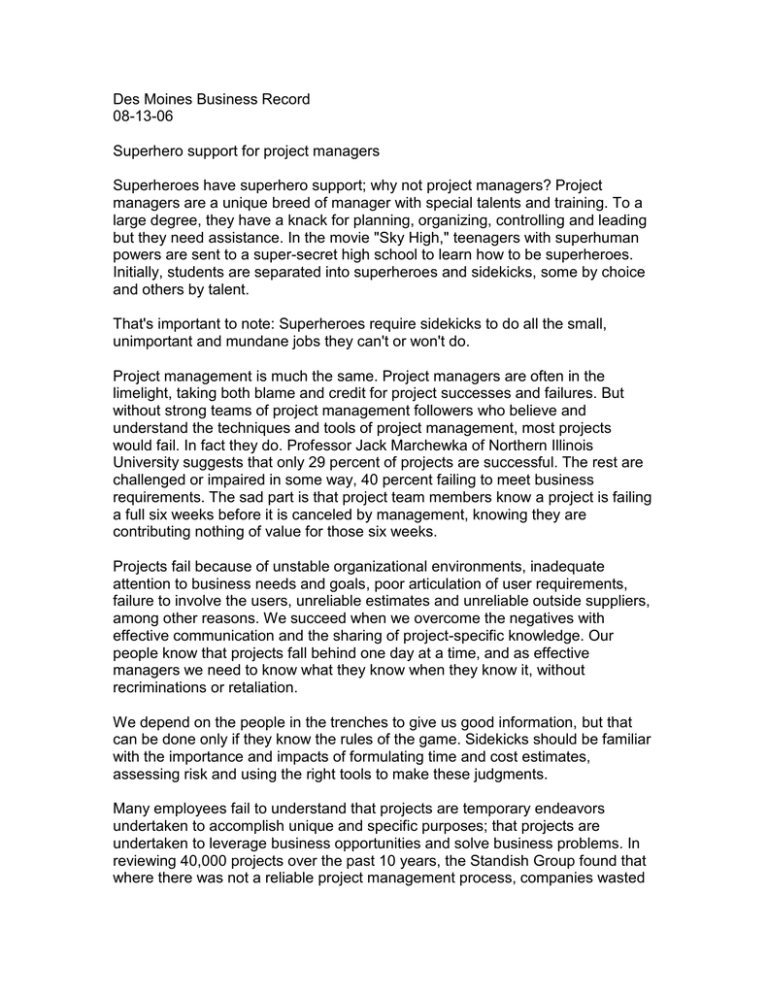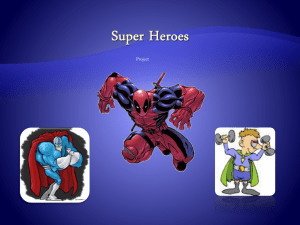Des Moines Business Record 08-13-06 Superhero support for project managers
advertisement

Des Moines Business Record 08-13-06 Superhero support for project managers Superheroes have superhero support; why not project managers? Project managers are a unique breed of manager with special talents and training. To a large degree, they have a knack for planning, organizing, controlling and leading but they need assistance. In the movie "Sky High," teenagers with superhuman powers are sent to a super-secret high school to learn how to be superheroes. Initially, students are separated into superheroes and sidekicks, some by choice and others by talent. That's important to note: Superheroes require sidekicks to do all the small, unimportant and mundane jobs they can't or won't do. Project management is much the same. Project managers are often in the limelight, taking both blame and credit for project successes and failures. But without strong teams of project management followers who believe and understand the techniques and tools of project management, most projects would fail. In fact they do. Professor Jack Marchewka of Northern Illinois University suggests that only 29 percent of projects are successful. The rest are challenged or impaired in some way, 40 percent failing to meet business requirements. The sad part is that project team members know a project is failing a full six weeks before it is canceled by management, knowing they are contributing nothing of value for those six weeks. Projects fail because of unstable organizational environments, inadequate attention to business needs and goals, poor articulation of user requirements, failure to involve the users, unreliable estimates and unreliable outside suppliers, among other reasons. We succeed when we overcome the negatives with effective communication and the sharing of project-specific knowledge. Our people know that projects fall behind one day at a time, and as effective managers we need to know what they know when they know it, without recriminations or retaliation. We depend on the people in the trenches to give us good information, but that can be done only if they know the rules of the game. Sidekicks should be familiar with the importance and impacts of formulating time and cost estimates, assessing risk and using the right tools to make these judgments. Many employees fail to understand that projects are temporary endeavors undertaken to accomplish unique and specific purposes; that projects are undertaken to leverage business opportunities and solve business problems. In reviewing 40,000 projects over the past 10 years, the Standish Group found that where there was not a reliable project management process, companies wasted 20 percent of their project dollars. "Employees" lack knowledge of the firm's project management methodology and the need to apply specific knowledge, tools, skills and techniques to project activities to meet specific requirements. Sidekicks remind, cajole, pester and focus project managers on the important tasks while keeping track of the small details that need to be done but don't require superhero attention. Turn your employees into project manager sidekicks. Formal training gets people on task and focuses projects on understood industrywide goals that will give the firm a competitive advantage. This is different from firms that see projects as tasks, only modifying processes or incrementally improving existing products and services. If we recognize that project management involves everyone in the firm in some way, at some time, that it affects career mobility and success, and that it is a management technique that works, we all stand to gain. Like Will Stronghold in "Sky High," superheroes may run into trouble, but when times are bleak, sidekicks come to the rescue. Project managers are much the same. They require sidekicks with support training to really emerge as the stars they are. Gary Hackbarth is an assistant professor of management information systems at the Iowa State University College of Business




